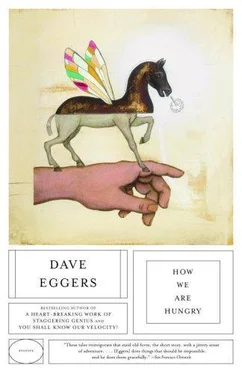Dave Eggers - How We Are Hungry
Здесь есть возможность читать онлайн «Dave Eggers - How We Are Hungry» весь текст электронной книги совершенно бесплатно (целиком полную версию без сокращений). В некоторых случаях можно слушать аудио, скачать через торрент в формате fb2 и присутствует краткое содержание. Год выпуска: 2005, Издательство: Vintage Canada, Жанр: Современная проза, на английском языке. Описание произведения, (предисловие) а так же отзывы посетителей доступны на портале библиотеки ЛибКат.
- Название:How We Are Hungry
- Автор:
- Издательство:Vintage Canada
- Жанр:
- Год:2005
- ISBN:нет данных
- Рейтинг книги:3 / 5. Голосов: 1
-
Избранное:Добавить в избранное
- Отзывы:
-
Ваша оценка:
- 60
- 1
- 2
- 3
- 4
- 5
How We Are Hungry: краткое содержание, описание и аннотация
Предлагаем к чтению аннотацию, описание, краткое содержание или предисловие (зависит от того, что написал сам автор книги «How We Are Hungry»). Если вы не нашли необходимую информацию о книге — напишите в комментариях, мы постараемся отыскать её.
A Heartbreaking Work of Staggering Genius
How We Are Hungry — читать онлайн бесплатно полную книгу (весь текст) целиком
Ниже представлен текст книги, разбитый по страницам. Система сохранения места последней прочитанной страницы, позволяет с удобством читать онлайн бесплатно книгу «How We Are Hungry», без необходимости каждый раз заново искать на чём Вы остановились. Поставьте закладку, и сможете в любой момент перейти на страницу, на которой закончили чтение.
Интервал:
Закладка:
Rita closes her eyes again and flies off. There are bits of conversation that make their way into her head, through vents in her consciousness. “What were they wearing?” “Well, think about it like the cabbies again. It’s a job, right? There are risks.” “Are you bringing the peanuts, too?” “Sleeping through it all isn’t going to make it go away, honey.” “I don’t have my headlamp. Does everyone else have a headlamp?”
J.J. and Frederick are in electric chairs. The Brussels stenographer is there, standing next to Rita, and they are smiling at the children. It is apparent in the logic of the dream that J.J. and Frederick are to be executed for losing a bet of some kind. Or because they were just born to be in the chair and Rita and the Brussels stenographer were born to hold their hands. J.J. and Frederick turn their eyes up to her. Rita is holding their hands as the vibrations start. She is resigned, knowing that there are rules and she is not the person to challenge them. But their teeth begin to chatter and their eyes rise to her and she wonders if she should do something to stop it.
“How do you feel, sweetie?”
Her head is clear and without weight. It again feels like part of her.
“You just needed time to acclimate, I bet.” Shelly is stroking her leg.
Rita raises her head and there is no pain. Lifting her head is not difficult. She is amazed at the lightness of her head.
“Well, if you’re coming, I think you’ll have to be ready in a few minutes. We’re already very late. We gotta get a move on.”
Rita doesn’t want to be in the tent anymore. She can finish this and have done it, whatever it is.
The terrain is rocky, loose with scree, and steep, but otherwise it is not the most difficult of hikes, she is told. They will simply go up until they are done. It will be something she can tell herself and others she has done, and being able to say yes when asked if she summitted will make a difference, will save her from explaining why she went down when two hikers over fifty years old went up.
Rita packs her parka and food, and stuffs the rest into her duffel bag for the porters to bring down to the next camp. The wind picks up and ripples the tent and she is struck quickly by panic. Something has happened. She remembers that Shelly had said something happened while she was asleep — but what? What was—
Mike. Oh Christ. Her stomach liquifies.
“Is Mike okay?” she asks.
She knows the answer will be no. She looks at Shelly’s back.
“Mike? Mike’s fine, hon. He’s fine. I don’t think he’ll be joining us today, but he’s feeling a little better.”
Rita remembers Grant going down the trail. What happened to Grant?
“I’m sure we can find him at the bottom, afterward,” Shelly says, applying a strip of white sunblock to her nose. “You can ask him then. He’s not the most normal guy, though, is he?”
The sky is clear and though the air is still cold, maybe forty-five or so, the sun is warm to Rita’s face. She is standing now, and almost can’t believe she is standing. She steps over the shale to the meal tent, the thin shards of rock clinking like the closing of iron gates.
Mike is at breakfast. It’s 8 a.m., and they are two hours behind schedule. They quickly eat a breakfast of porridge and hard-boiled eggs and tea. Everyone is exhausted and quiet. Grant has gone down the mountain and Mike is not going up. She smiles to Mike as he bites into an egg.
The remaining paying hikers — Rita, Jerry, Shelly — and Frank and Patrick say goodbye. They will see Mike again in about twelve hours, they say, and he’ll feel better. They’ll bring him some snow from Kibo, they say. They want to go and drag their bodies to the top, and from there they can look down to him.
It’s glorious. From the peak Rita can see a hundred miles of Tanzania, green and extending until a low line of clouds intercepts and swallows the land. She can see Moshi, tiny windows reflecting the sun, like flecks of gold seen beneath a shallow stream. Everyone is taking pictures in front of a sign boasting the altitude at the top, and its status as the highest peak in Africa, the tallest freestanding mountain in the world. Behind the signs is the cavity of Kibo, a great volcanic crater, flat, paislied with snow.
On the Moshi side of the mountain, the glaciers are low and wide, white at the top and striped from her viewpoint, above. She sees the great teeth of a white whale. Icicles twenty feet tall extend down and drip onto the bare rock below.
“They’re disappearing,” Jerry says. He is standing behind Rita, looking through binoculars. “They melt every year a few feet. Coming down slowly but steadily. They’ll be gone in twenty years.”
Rita shields her eyes and looks where Jerry is looking.
There are others at the top of Kibo, a large group of Chinese hikers, all in their fifties, and a dozen Italians wearing light packs and with sleek black gear. The hikers who have made it here nod as they pass each other. They hand their cameras to strangers to take their pictures. The wind comes over the mountain in gusts, ghosts shooting over the crest.
The hike up had been slow and steep and savagely cold. They rested ten minutes every hour and while sitting or standing, eating granola and drinking water, their bodies cooled and the wind whipped them with broad sharp strokes. After four hours Shelly was faltering and said she would turn back. “Get that pack off!” Frank yelled, tearing it off her as if it were aflame. “Don’t be a hero,” he’d said, giving the pack to one of the porters. Shelly had continued, refreshed without the weight. The last five hundred yards, when they could see the tip of the mountain just above, had taken almost two hours. They’d reached the summit as the sun grew out of a band of violet clouds.
Now Rita is breathing as fast and as deeply as she can — her headache is fighting for dominion over her skull, and she is panting to keep it at bay. But she is happy that she walked up this mountain, and cannot believe she almost stopped before the peak. Now, she thinks, seeing these views in every direction, and knowing the communion with the others who have made it here, she would not have let anything stop her ascent. She knows now why a young man would continue up until crippled with edema, why his feet would have carried him while his head drained of blood and reason. Rita is proud of herself, and loves her companions, and now feels more connected to Shelly, and Jerry, Patrick, and Frank, than to Mike, or even Grant. Especially not to Grant, who chose to go down, though he was strong enough to make it. Grant is already blurry to her, someone she never really knew.
Rita finds Shelly, who is sitting on a small metal box chained to one of the signs.
“Well, I’m happy anyway,” Shelly says. “I know I shouldn’t be, but I am.”
Rita sits next to her, panting to keep her head clear.
“Why shouldn’t you be happy?” Rita asks.
“I feel guilty, I guess. Everyone does. But I just don’t know how our quitting would have brought those porters back to life.”
“Back to life? Who?”
“Last night,” Shelly says. “Or the night before last. The last night we slept, when you were sick, Rita. Remember? The rain? It was so cold, and they were sleeping in the mess tent, and there was the hole, and the tent was so wet…”
“Why didn’t we— Didn’t someone—”
“They just didn’t wake up, Rita. You didn’t know? I know you were asleep but really, you didn’t know? I think part of you knew. Who do you think they were carrying down?”
“I didn’t see.”
“They were young boys. They didn’t have the right clothes. Can you imagine doing this without the right gear? Really, Rita? I thought maybe you knew. I think people have a sense for these things, when something like that is going on, don’t you?”
Читать дальшеИнтервал:
Закладка:
Похожие книги на «How We Are Hungry»
Представляем Вашему вниманию похожие книги на «How We Are Hungry» списком для выбора. Мы отобрали схожую по названию и смыслу литературу в надежде предоставить читателям больше вариантов отыскать новые, интересные, ещё непрочитанные произведения.
Обсуждение, отзывы о книге «How We Are Hungry» и просто собственные мнения читателей. Оставьте ваши комментарии, напишите, что Вы думаете о произведении, его смысле или главных героях. Укажите что конкретно понравилось, а что нет, и почему Вы так считаете.












